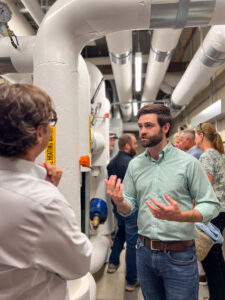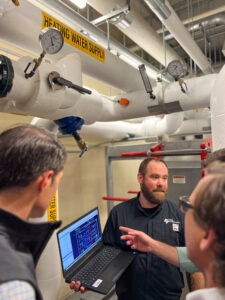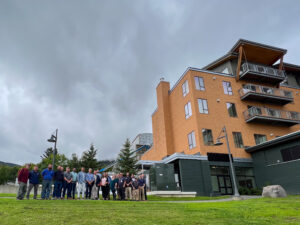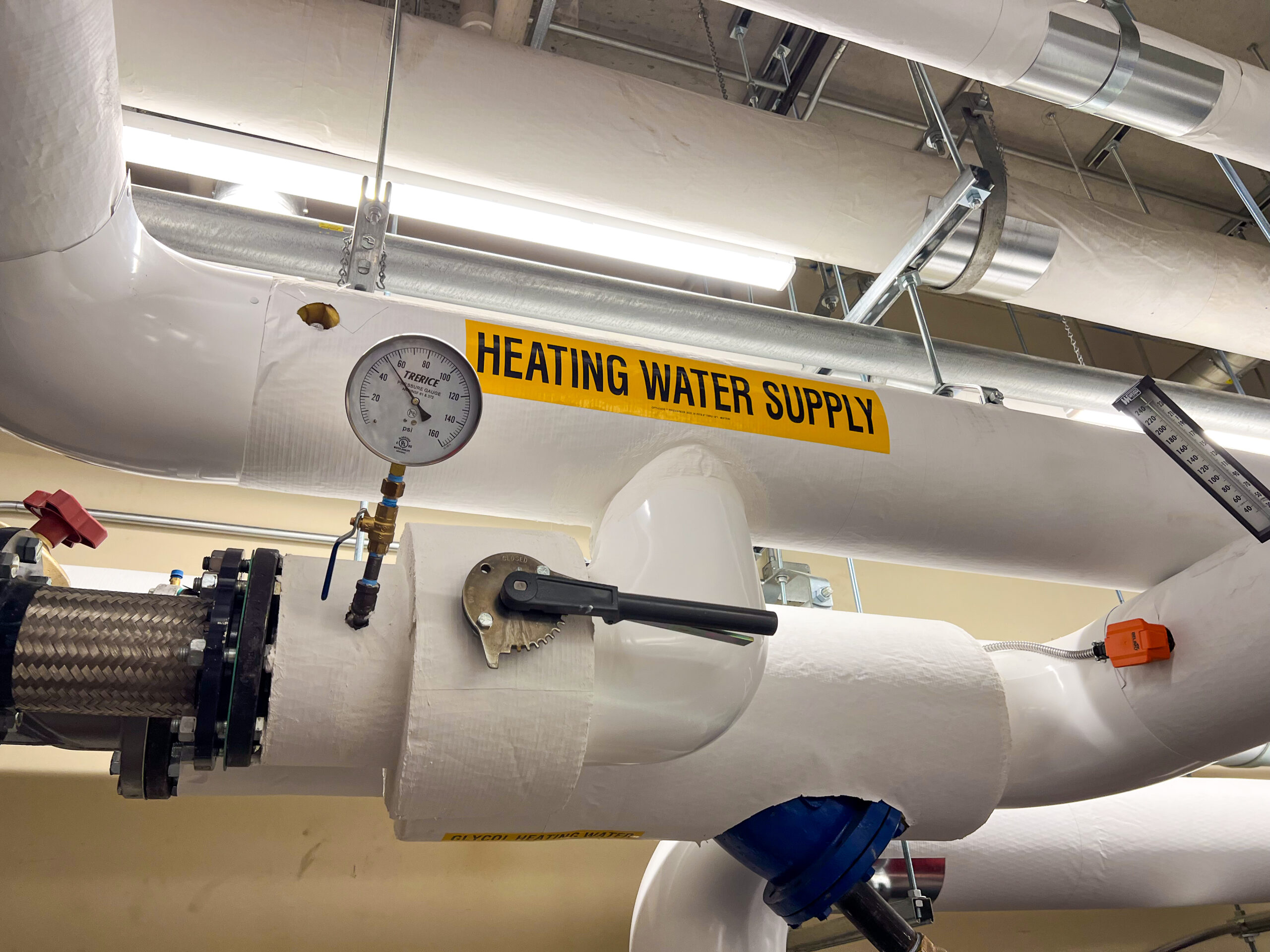Tapping into excess renewable energy, Medley Thermal (acquired by Antora Energy) reduces carbon emissions and energy costs at the Northern Vermont ski resort.
Even as an engineering undergrad, Jordan Kearns, founder of Medley Thermal, knew he wanted to build something “big, new, and good” in the energy space. Focused on reducing both heating costs and carbon emissions in large buildings, Kearns discovered two problems that, taken together, offered an opportunity.

The first problem is that heating commercial and industrial buildings is expensive and, at the moment, met primarily with fossil fuels. The second problem is that renewable energy resources are intermittent. Abundant only when the sun is shining or the wind is blowing, energy from renewable sources is at times too low to meet demand and, at other times, so high that the grid can’t absorb it all.
“A lot of ink is spilled over how we can make energy from wind and solar 100% reliable,” said Kearns. “Less attention has been paid to what we do when it’s really windy or really sunny and we have more electrons that can be used.”
Kearns solution is a system designed to selectively use energy from renewable sources when they are low-cost and abundant. When it’s really windy, turbines can produce more energy than can be transmitted beyond the local area. Without capacity to move those clean electrons elsewhere, the energy is either wasted or sold at a very low price making it less profitable, which doesn’t incentivize new development in wind. Medley Thermal’s solution makes use of those clean electrons, while creating demand for energy that would otherwise be wasted.
“A lot of people have a sense that we have to reduce emissions,” said Kearns, “but I wanted an approach that also addressed cost. It’s hard to adopt a greener resource just because we know it’s the right thing to do. It’s easier when it’s cost effective, and there is virtually free, green energy that nobody is using. How can we change that?”
By gathering data from multiple sources, including energy load and real time pricing, transmission and use data, and detailed weather forecasts, Medley Thermal’s software is able to predict when it will be most environmentally beneficial and cost effective for commercial and industrial buildings to tap energy from renewables.
“We’re bringing in real time data to understand and make predictions about how clean, how costly, and how constrained the grid is at a specific moment in time,” said Kearns.
When the wind is low or it’s cloudy and clean electricity is expensive, the system can turn off and go to a backup. When clean energy is abundant and would otherwise be wasted, the system turns on and puts those clean electrons to good use.
Moving from idea to implementation
By 2019, Kearns and his business partner, Christian Briere, were ready to pilot their prototype in the real world. “We were looking for a place that had large heating demand, was in an area where low-cost renewable energy was intermittently available, and where geography made fossil fuels expensive,” he said.
Right around that time, Kearns met Geoff Robertson, managing director of DeltaClimeVT at the Vermont Sustainable Jobs Fund (VSJF), who was in Boston to talk about the accelerator program.
“We had done other accelerators,” said Kearns, “but when Geoff started talking about the program’s emphasis on pilots and established relationships with utilities, my ears perked up. We needed a demonstration site to prove this idea at scale and Vermont sounded ideal.”
Medley Thermal joined the Energy 2020 cohort of DeltaClimeVT, the first to meet remotely during the pandemic. By the end of the program, Medley Thermal not only had a $15,000 cash award, they also had their demonstration site.
Team effort secures pilot at Jay Peak

Jay Peak met all the criteria. The four-season resort has significant energy needs to power the hotel, snowmaking, indoor waterpark, and an underground snowmelt system, as well as a goal to reduce the resort’s carbon footprint. Proximity to the Kingdom Community Wind Farm meant access to renewable energy, and Jay Peak’s geographic location in the far reaches of northern Vermont meant that propane delivery was especially expensive.
Equally important, Vermont utilities, regulators, and state officials rallied behind the project. “The project checks every box for us,” said Andrea Cohen, manager of government affairs and member relations at Vermont Electric Cooperative, Inc. (VEC). “It helps Coop member Jay Peak reduce energy costs and carbon emissions, and allows us to meet our regulatory obligations.”
Cohen notes that renewable energy in northern Vermont, specifically from Kingdom Community Wind, is frequently “curtailed” due to a lack of local electric load and insufficient transmission export capacity. “This constraint wastes existing renewable resources and stymies development in renewable generation,” she said. “We hope Jay Peak will inspire similar projects in the region and, ultimately, result in financial benefit to VEC members.”

Kearns adds VEC paved the way for the project with an innovative tariff that allows ski areas in Vermont to use low-cost energy for snowmaking as long as they are flexible about when they use it. “It’s really cool that a small Coop has already solved a problem that is now ubiquitous for larger utilities,” said Kearns. “I take the Vermont Electric Coop model with me everywhere I go.”
Still recovering from the pandemic, Jay Peak was able to secure state funding through the American Rescue Plan Act, which allocated money for green energy investment in hospitality businesses hard hit by COVID-19. That funding came on top of investments by VEC, Vermont Gas Systems, and the Massachusetts Clean Energy Center (MassCEC). In addition to shouldering a portion of the capital cost of the project, the MassCEC funding was used to conduct initial engineering and technical assessments of the Jay Peak project. The contribution from Vermont Gas helped to get the project over the finish line, which is remarkable, says Robertson, in that Jay Peak uses propane. “They saw an opportunity to be part of an innovative project that could have benefit to them down the line and jumped in,” he said.
Lastly, Efficiency Vermont worked with Jay Peak and Medley Thermal to adapt their existing incentive program. The program encourages businesses and residences in Vermont to invest in energy efficiency and clean energy, so the project fit well with Efficiency Vermont’s larger goals, but not within any specific program. “Efficiency Vermont was willing to work with us to customize the incentive and help fund the project,” said Kearns.
“This is a story of relationships building on relationships and DeltaClimeVT bringing them all together,” said Cohen, who is also on the VSJF’s Board of Directors.
The project is expected to reduce propane consumption from the main hotel and waterpark by 60 percent, and carbon emissions by 78,000 metric tons over its life, or about 2,500 tons a year. That’s the equivalent of removing 550 gas vehicles per year from the road. Energy savings for the resort are estimated at $175,000 annually, strengthening Jay Peak’s ability to retain employees and support economic activity in the region. Additionally, this project will shift $540,000 in annual spending from largely out-of-state propane supply to the cleaner, and primarily local electricity supply chain.
Getting to 100%
Even with the Jay Peak project underway and a strong pipeline of projects queuing up, there was one question that was left unresolved. Medley Thermal’s software allowed businesses to access clean, low-cost energy. But because the system relies on a backup boiler that is most often tied to fossil fuel, a gap remained for customers who wanted to achieve 100% decarbonized energy.
In the case of Jay Peak, VEC is able to fill the gap so that the resort’s energy use is 100% decarbonized. But Kearns wanted a solution he could bring to future clients outside of Vermont.
He reconnected with a colleague from graduate school, David Bierman, who had also studied energy ventures at Massachusetts Institute of Technology (MIT). While Kearns focused on software and regulatory issues, Bierman had tackled the same problems from a hardware perspective, co-founding Antora Energy in 2018. Antora’s thermal storage technology allows customers to store clean energy when it’s cheap and abundant, storing that energy as heat for use at any hour of the day—enabling the cost-effective decarbonization of industrial heat at facilities across the country.
Kearns and Bierman began to talk about working together, leading to Medley Thermal’s acquisition by Antora in 2022. “It’s a great match,” said Kearns. “Bringing the software, regulatory, and hardware solutions all under one roof allows us to help customers achieve 100% decarbonization.”
Big, new and good
“I’ve known for a long time what I want to do,” said Kearns. “I want to build things that are big, new, good in the energy space. Big and good, but not new, lacks innovation. Seeing the Jay Peak project come to fruition, which would not have happened without DeltaClimeVT, is the first real step.”
Medley Thermal is exactly the kind of startup that DeltaClimeVT is designed to attract. “The idea is promising, the company is poised to scale, and Vermont can offer an incubator space to bring it from conception to pilot,” said Robertson. “Where else can you bring entrepreneurs, state regulators, utility CEO’s, and funders together and no one has to drive more than a couple of hours? It’s the secret sauce of Vermont’s energy tech scene–everyone is at the table.”

Now, as the vice president of project development at Antora Energy, Kearns and his team are using Medley’s software and project development expertise to decarbonize some of the biggest industrial heat loads in the country.
“The climate crisis can’t be solved within the borders of Vermont,” said Robertson, “but by supporting startups like Medley in the early stages of their growth, we can be a first step.”
About DeltaClimeVT – A Climate Economy Business Accelerator
Managed by the Vermont Sustainable Jobs Fund (VSJF), the DeltaClimeVT business accelerator is a Vermont-based program serving startup and seed-stage ventures focusing on energy and climate economy innovation in the energy sector. The program provides an intense accelerated learning and business development process designed to test assumptions, expose, and remediate business vulnerabilities, prepare for significant investment, and provide a platform for rapid scaling. As a proven leader in sustainability, Vermont offers participants access to many entrepreneurial climate economy and energy experts throughout the program. For more details, visit deltaclimevt.com or contact Geoff Robertson at geoff @ vsjf.org.
About Vermont Sustainable Jobs Fund
In addition to offering the DeltaClimeVT business accelerator to startup and seed stage entrepreneurs, the Vermont Sustainable Jobs Fund (VSJF) provides business assistance, value chain facilitation, network development, and strategic planning to a wide range of stakeholders in the agriculture and food system, forest product, waste management, renewable energy, and environmental technology sectors. Located in Montpelier, Vermont, VSJF was created by the Vermont Legislature in 1995 to partner with state government, private sector businesses, and nonprofits to build a thriving economic, social, and ecological future for Vermont. www.vsjf.org
Read More Stories Like This:
- ProsumerGrid wins the Vermont-based DeltaClimeVT Energy 2023
- The Power of Paying it Forward: An Interview with SaLisa Berrien, COI Energy
- Vermont Startup Bets on Better Data to Decarbonize Buildings
- Grid Fruit Founders Focus on Refrigeration to Help Cool the Planet
- Slowing Climate, Change One Window at a Time

